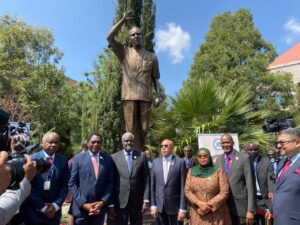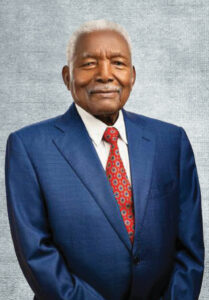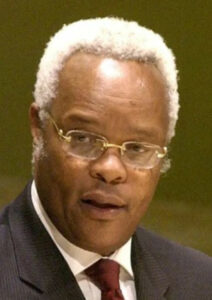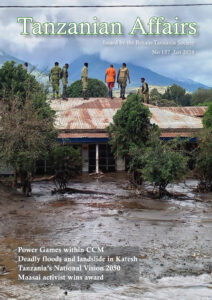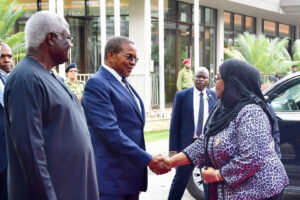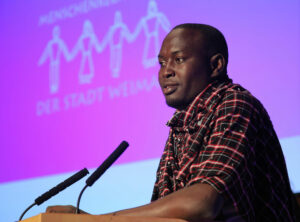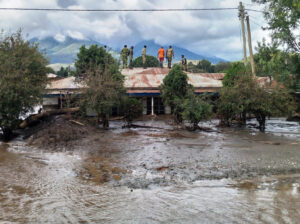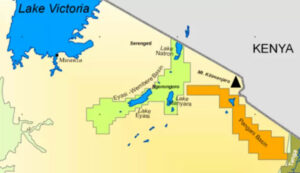by Martin Walsh
RELIGION, SOCIETY AND THE PANDEMIC: A COMPLEX ENTANGLEMENT. Karim Hirji. Daraja Press and Zand Press, Toronto, 2024. 520 pp. ISBN: 9781990263958 (hardback) USD $50.00; ISBN: 9781998309009 (eBook) USD $7.99.
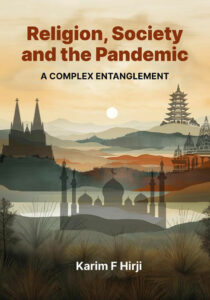
This is Hirji’s third recent book about religion and society. The first part of the book draws on his expertise as a medical statistician to present comparative data on reported numbers of COVID cases, reported deaths per million of population, and excess mortality, the difference between the numbers reported to have died in a period and those who were expected to die. It is clear that for many countries only a fraction of the cases were known to their governments or reported. The data demonstrate that vaccines were effective in controlling the COVID pandemic, especially when combined with good-quality protective clothing for health workers, border closures, the wearing of masks, and lockdowns.
Most of the rest of the book comprises case studies of 17 countries which show how the responses to the pandemic were influenced by religious beliefs. In three of these, the predominant religion is Hinduism, in two it is Buddhism, in five Christianity (including the USA, Brazil, South Africa and Tanzania), in four Islam, and in three (Cuba, Singapore and China) religion does not have significant influence. This selection includes three of the countries which experienced the most cases and deaths per million people (the USA, Brazil and India), but not Russia (which was not far behind the USA) or any European countries.
The main overall conclusion is that where leaders accepted the conclusions of the medical researchers and the World Health Organisation and imposed strict measures, the virus was controlled. Elsewhere it got close to getting out of hand and overwhelming the health services. Pope Francis was aware of this from an early stage and most of the Roman Catholic Church followed his lead. So did many of the reformed churches. The worst outcomes occurred where nationalist leaders downplayed what needed to be done and rubbished the work of the scientists, as in the USA under Trump, India under Modi, and Brazil under Bolsonaro.
Two months before the number of cases in America reached a million, Trump announced that “cases were going to be down, to close to zero”. He used racist language, especially against China, disparaged vaccines, and withdrew his country from the WHO, the nerve-centre of the international fight against the virus. Most mainstream churches supported vaccination and recognised the need for lockdowns. But many evangelicals and tele-evangelists, and other followers of Presidents Trump, did not.
In Africa, there was a great contrast between South Africa and Tanzania. In South Africa over 4 million cases were reported, and more than 90,000 people were reported to have died, though the actual figure is probably more. Tanzania had relatively few cases. Hirji’s 18 pages contrast the situations under Presidents Magufuli and Mama Samia Hassan. Magufuli closed the schools a day after the first case was detected, introduced quarantines for travellers entering the country, promoted mask-wearing, social distancing, and hand sanitisers, and limited the numbers of passengers on buses. He recruited artists and musicians to create murals and songs. But a few months later he started attacking vaccination and was promoting extremely dubious tests and remedies. He stopped the testing programmes and ceased supplying data to the WHO. He was the only world leader who said that going to church would save you from the virus!
Mama Samia quickly showed that she respected the scientists and international organisations. She implemented lockdowns, resumed the monitoring of incoming flights and the supply of data to the WHO and launched what turned out to be effective campaigns to get as many people as possible vaccinated, though those under 15 years of age (nearly half the population) were not included.
Hirji makes some heroic assumptions to replace the figures missing from the Magufuli period. But, even so, he concludes that Tanzania escaped extremely lightly, with one of the lowest rates of infection of any country. He speculates about why this was so. Children under 15 were less vulnerable, and there were relatively fewer old or very old people. Some immunity may have arisen from other viruses which were circulating. There are few homes for elderly people. He does not point out that a lot of activity in Tanzania takes place outdoors, and that where it is inside it is often in well-ventilated churches, mosques or temples or offices with “natural ventilation”. Buses, where the virus was widely spread in colder countries, are crowded but they have a lot of circulating air.
The final chapters make general points. In almost all countries, the concentration of medical expertise on combatting the virus diverted resources away from other health challenges. It “reversed a decade-long global trend of reduction of poverty and absolute poverty levels” and increased the numbers who were poor, while the very rich got even richer. It also reduced industrial and rural production, disrupted education, and increased intolerance and hate. Digital platforms “spawned fear and panic”. It took resources and interest away from the environmental crises which the world needs to face and encouraged authoritarian regimes and military spending. Overall, it showed up the limitations of the neo-liberal ideologies which dominate the present-day world.
This book does not single out any particular religion, but it is very supportive of religion as a whole: “Traditionally, religion has served as a key source of emotional and social support, especially when faced with loss, stress and uncertainty. People pray and reach out to the heavenly saviour […] Scientific studies show that regular prayer calms the mind, enhances resilience, lightens the angst and worries weighing you down, mollifies anger and anxiety, and raises the spirit. […] It is not an issue of whether God exists or not but of believing that he does” (p. 310). The book ends with a poem from a collection compiled by an American non-profit Catholic organisation with a mission to help the weak and the poor.
Andrew Coulson
Andrew Coulson worked in the Planning Unit of the Ministry of Agriculture in Dar es Salaam 1967-1971 and taught agricultural economics at the University of Dar es Salaam 1972-76. His edited book African Socialism in Practice: The Tanzanian Experience was published in 1979. Tanzania: A Political Economy followed in 1982, with a second edition in 2013. His most recent book, with Antony Ellman and Emmanuel Mbiha, is Increasing Production from the Land: A Sourcebook on Agriculture for Teachers and Students in Africa (Mkuki na Nyota, 2018). He was Chair of the Britain Tanzania Society 2015-18.
BAOBAB: THE HADZA OF TANZANIA AND THE BAOBAB AS HUMANITY’S TREE OF LIFE. John Rashford. Springer, Cham, Switzerland, 2023. xxix + 382 pp. ISBN: 9783031264696 (hardback) £149.99; ISBN 9783031264702 (eBook) £119.50.
John Rashford is Professor Emeritus of Anthropology at the College of Charleston in South Carolina. Much of his research has focused on the ethnobotany of the Caribbean and over the years he has published several papers on the occurrence and uses of African baobabs (Adansonia digitata) both there and elsewhere, including an early (1987) article on baobabs and seasonal hunger among the San peoples of southern Africa. Now he has turned his interest in Africa’s most iconic tree into a full-length book that sets out to show how it may have played an important role in early human evolution on the continent. He does so by documenting the multiple uses of the baobab among the Hadza people of north-central Tanzania and projecting their practice into the distant past. While recognising that modern circumstances are very different, “Hadza are theorized to be similar to early hominins [sic] with respect to foraging on the African savanna” (p. xi), and so suitable as a model for palaeontological reconstruction. If the baobab can be shown to be their “tree of life”, then it can be presumed to have had the same status in the early history of humanity – or so Rashford argues.
There are of course all sorts of problems with this kind of argument, not least the assumptions it makes about both the present and the past and the ways in which they might be connected. To compound matters, the author is not a palaeontologist (as evidenced by his misuse of the term “hominin”) and has not undertaken research among Hadza speakers in Tanzania but has relied on the available literature, including travellers’ reports on the web. Oddly, there is no mention at all in Baobab of research into the genetic ancestry of Hadza and the history of their unique click language and the external influences upon it. Equally surprisingly, there is relatively little discussion of Hadza ethnobotanical knowledge and practice aside from the use of baobabs, and scant recognition of the very wide range of plants that feature in people’s lives and livelihoods other than this one species. As a result, the historical thesis that frames Rashford’s book never really goes anywhere, and his speculative attempts to prove it largely fizzle out well before the halfway mark, at the end of its second part.
That said, there’s a lot more to this book than its framing hypothesis. Rashford knows his baobabs and covers a lot of ground, especially when searching for data on Hadza uses of the tree and supplementing this with comparative ethnographic evidence. This quest for knowledge dominates the remainder of the book (parts III-VII) and left me wondering whether it might have been rewritten as a critical review of what we know and don’t know about the tangible and intangible uses of the baobab among Hadza speakers, with questions and suggestions for future researchers. As a reader with an interest in ethnobotanical knowledge and practice in the wider region, I know that I will continue to refer to these parts of the book as a source of ideas and useful information, references included. Rashford has a knack for questioning existing typologies and terminologies, and I found his discussion of seasonality and famine foods especially interesting, building as it does on his earlier work on baobabs.
I was struck by Rashford’s analysis of the reasons for a lack of knowledge about the role of baobabs in what he calls Hadza “inspirational life”, among them the predominantly “materialist orientation” of forager studies and the reluctance of Hadza to reveal everything about themselves to outsiders who often treated them with extreme prejudice in the past. Like many other researchers, Rashford does not refer to more obscure sources, such as Kohl-Larsen’s collections of Hadza tales (Das Elefantenspiel and Das Zauberhorn, both 1956) and the selection of them translated into Swahili in Annette Wagner’s compilation (Hadithi za Wahadzabe kutoka Tanzania, 2000). Nevertheless, given the circumstances in which these stories were recorded, they should be treated with caution. It would be good to see more of Hadza oral and other traditions in print and on film, and Rashford does make use of the excellent volume and accompanying CD of Hadza music compiled by Daudi Peterson and colleagues, Hadzabe: By the Light of a Million Fires (2013, reviewed in Tanzanian Affairs 110, 2015). Rashford’s own book is very different from that work in its conception and presentation. It should have been extensively edited, and not just to remove obvious signs of carelessness, such as mistakes in the formatting of its references.
Martin Walsh
Martin Walsh is the Book Reviews Editor of Tanzanian Affairs.
SWAHILI WORLDS IN GLOBALISM. Chapurukha M. Kusimba. Cambrudge University Press, Cambridge, 2024. 98 pp. ISBN: 9781009495080 (hardback) £49.99; ISBN: 9781009074056 (paperback) £17.00.
Through nearly three decades of field research and numerous scholarly publications, Professor Chapurukha Kusimba has established an admirable reputation as one of the leading archaeologists currently working in East Africa. His newest title, Swahili Worlds in Globalism, is a contribution to a Cambridge University Press series of “concise studies that introduce [readers] to an uncentered interconnected world, 500-1500 CE” and focuses “on the globe’s geographic zones, its natural and built environments, its cultures, societies, arts, technologies, peoples, ecosystems, and lifeworlds.” Towards these ends, Kusimba organises his task into six short, summary chapters, beginning with the foundations of medieval, East African, urban civilisation; and the “rise” of the coastal states; and a detailed description of what the Swahili world was like. These three chapters comprise the data-based core of the book, while the next two look outward to fix the East African coast within the wider world of the Indian Ocean with chapters on its global, and specifically Asian connection.
In his introduction, Professor Kusimba briefly reviews past interpretations of who the people of the Swahili communities were and what their putative “origins” were. Along these lines, readers will recognise the long-familiar notion of their “Arab” past, which persisted well into the 1960s. Since then, a wide array of archaeological field work, historical linguistic research, and close textual studies of external accounts and local oral traditions have altered and refined this perspective considerably. Most scholars now subscribe to an important emendation of this thesis, which hinge on the important distinction between the actual origins of coastal civilization and the identities coastal inhabitants have assumed over the centuries. The intensive research mentioned above has established definitively their African ancestry. In Chapters 1-2, Kusimba marshals forth the archaeological attestations for their Sabaki Bantu-speaking ancestry, along with some of the linguistic evidence.
Notwithstanding this African heritage, intensive commercial intercourse and immigration began around 800 CE and extended well into the second millennium, In Chapters 2-3, he reviews how Swahili communities underwent extensive cultural and social changes, some of which he summarises in the text. The results were stunning, especially in entrepôts (e.g. Manda, Pate, Kilwa) that functioned as the commercial centres of regional webs that stretched inland and to captive feeders of commodities and craft production. His discussion then details their dramatic increases of wealth, the noticeable trend towards Islamisation, intensified immigration from African hinterlands and Asia, and their conspicuous trends towards regionalisation, social complexity, and stratification. In Chapter 5, he further discusses the wider community to which Swahili-speaking towns were conjoined in the vast array of oceanic commerce that included primarily Western and South Asian centres of trade and industrial production like Chaul, Gujerat, Siraf, and, secondarily, Eastern and Southeastern Asia. He provides, for example, a brilliant analysis and delineation of the direct trade between Chaul and Mtwapa (pp. 56-68).
Professor Kusimba concludes with a final chapter that summarises his views concerning “who” medieval, coastal East Africans were. He cites the presence of pastoralists at some early sites (namely Shanga) and the presence of some Cushitic loanwords in Swahili as evidence of shared Bantu and Cushitic origins. However, this hypothesis is ambivalent, in as much as Bantu-speakers were in close proximity to and borrowing loanwords from Cushitic-speakers well before they settled the coast. The same applies to his (and others’) proposition that their earliest ancestors retained matrilineal customs and rights until later conversion to Islam (c. 800-1500 CE) shifted them more towards patrilineality. Again, the evidence for this is ambiguous, and alternative postulations are equally plausible.
Aside from such minor quibbles, however, Professor Kusimba’s new contribution to East African and Swahili studies is a fine work of investigative scholarship. It provides readers with a clear, concise, and evidenced-packed update of the present state of what has been revealed from archaeological research over the past thirty-odd years.
Randall L. Pouwels
Randall Pouwels is an Emeritus Professor of History at the University of Central Arkansas. He received his B.A. degree from the University of Wisconsin, and his Ph.D. in History from the University of California, Los Angeles. Since 1974, he has published widely on the history of East Africa, with a specialty in using oral traditions for historical reconstruction.
Also noticed:
USIMAMIZI WA MISIKITI: KWA UFANISI. M. Bashir Khatri. PKA Books Limited, Leicester, 2023 (first translated 2021). vi + 66 pp. ISBN: 9780954391102 (eBook). Free to download from https://www.pkabooks.com/ shop/usimamizi-wa-miskiti-kwa-ufanisi/.
This slim volume is a Swahili translation of M. Bashir Khatri’s Management of the Masjid: A Strategic Approach (2015), a guide to managing mosques and their affairs in the UK. As the original blurb states, “The author’s aim is to meet the needs of the readers who want to understand and apply management principles strategically in line with Islam. This book is written in a style easy to read for stakeholders / worshippers as well as those who are trustees, managers, volunteers, academics and professionals.” Together with other works written by the Zanzibar-born author, a trained accountant who has lived in the UK since 1972, it is available on his self-publishing website, www.pkabooks.com.
Martin Walsh



